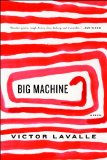Summary | Excerpt | Reviews | Beyond the Book | Read-Alikes | Genres & Themes | Author Bio

Critics' Opinion:
Readers' Opinion:
First Published:
Aug 2009, 384 pages
Paperback:
Mar 2010, 384 pages
 Book Reviewed by:
Book Reviewed by:
Marnie Colton
Buy This Book
This article relates to Big Machine
While the Washburn Library is a purely fictional invention, it does have an analog in the real world: the Rhine Research Center, once known as the Foundation for Research on the Nature of Man, and home to the Institute for Parapsychology until 2002. Formerly affiliated with Duke University, the Rhine now operates independently a short distance away from the campus and continues to conduct research into consciousness, specifically, those aspects that for many years have resisted scientific explanation. While the Center has moved beyond its original mission in the 1920s to conduct experiments on extrasensory perception (ESP) and psychokinesis (PK), it still focuses largely on topics shunned by traditional science. For instance, the Center’s current research interests include "human biofields, telepathy, and mind-over-matter." Its official research organ, the Journal of Parapsychology, contains articles with titles like "What is Beyond the Edge of the Known World?" and "Poltergeists, Electromagnetism and Consciousness." Their website even sells ESP-testing cards, known as Zener Cards, for $25 per pack.
Just as the Unlikely Scholars in Big Machine hunt for newspaper articles that might point to the continued existence of the Voice that spoke to Judah Washburn, the Rhine Center’s scholars collect descriptions of "unexplained physical events." The University of Virginia Health System’s Division of Perceptual Studies also collects this sort of information, focusing on children who remember past lives, near-death experiences (NDEs), and out-of-body experiences (OBEs). Most scientists, however, do not accept recorded anecdotes of experiences as concrete, verifiable evidence, as they cannot be replicated in a lab.
Michael Shermer, scientist and founder of Skeptic Magazine, cites laboratory studies disproving parapsychology’s claims that such experiences are external manifestations that provide proof for an unperceived realm. On the contrary, researchers have successfully induced OBEs in subjects by manipulating certain regions of the brain while numerous ESP studies have failed to provide replicable data, corroborating Shermer’s statement that "…mind and brain are one. All experience is mediated by the brain." In Shermer’s view, it’s simply a matter of time before the parapsychologists capitulate to the neuropsychologists and accept that the only way to study consciousness is to employ the same rigorous standards as traditional scientific fields like biology and chemistry.
Why then, in the face of overwhelming scientific evidence, do so many people continue to believe in ghosts, UFOs, communications with the dead, and past lives? A number of books address this question (Why People Believe Weird Things: Pseudoscience, Superstition, and Other Confusions of Our Time by Michael Shermer, The Demon-Haunted World: Science as a Candle in the Dark by Carl Sagan, Flim Flam! Psychics, ESP, Unicorns, and other Delusions by James Randi, and How We Know What Isn’t So: The Fallibility of Human Reason in Everyday Life by Thomas Gilovich), but a quick glance through your local library or bookstore will reveal that the paranormal tomes are the ones flying off the shelves. Sometimes the popular scientific titles themselves only confuse people further. Controversy surrounds geneticist Dean Hamer, whose book The God Gene: How Faith is Hardwired Into Our Genes, was greeted with alarm from members of the religious community and with skepticism from his fellow scientists (Hamer published his book prior to publishing his study in a peer-reviewed scientific journal, the traditional method for presenting new hypotheses). In the flurry surrounding the book’s publication, Time Magazine devoted a cover story to it in 2004, thus lodging the term "God gene" in the minds of millions. While genes undoubtedly play a major role in shaping us as humans, most scientists also factor in influences like environment, personality, and heredity, so that a gene coded for spirituality would be considered only one piece of the neurological puzzle.
There is something fundamentally frightening about pondering the ramifications of Shermer’s claim that all experience is mediated by the brain, akin to the freefall experienced when first encountering Existentialist philosophy. Paradoxically, it may seem less frightening, more comforting, to believe that ghosts can materialize in our attics, aliens can whisk us aboard their flying saucers, and mediums can relay messages from our dead loved ones. As Shermer states, the brain cannot perceive itself, which accounts for our interpretation of internal, neurological events as visitations, OBEs, and psychic phenomena. In this regard, organizations like the Rhine Research Center and the Division of Perceptual Studies seem like relics from a pre-scientific time when folklore and hearsay substituted for the scientific method. If parapsychologists were more willing to embrace neurological breakthroughs to explore their hypotheses, perhaps they could receive the scientific credibility that they seem to crave. Then again, if they did so, they would no longer be parapsychologists, and stripped of that esoteric prefix which means "at, or to one side of," the appeal of toiling in a misunderstood field might disappear.
Filed under Medicine, Science and Tech
![]() This "beyond the book article" relates to Big Machine. It originally ran in September 2009 and has been updated for the
March 2010 paperback edition.
Go to magazine.
This "beyond the book article" relates to Big Machine. It originally ran in September 2009 and has been updated for the
March 2010 paperback edition.
Go to magazine.





The Funeral Cryer by Wenyan Lu
Debut novelist Wenyan Lu brings us this witty yet profound story about one woman's midlife reawakening in contemporary rural China.
Your guide toexceptional books
BookBrowse seeks out and recommends the best in contemporary fiction and nonfiction—books that not only engage and entertain but also deepen our understanding of ourselves and the world around us.